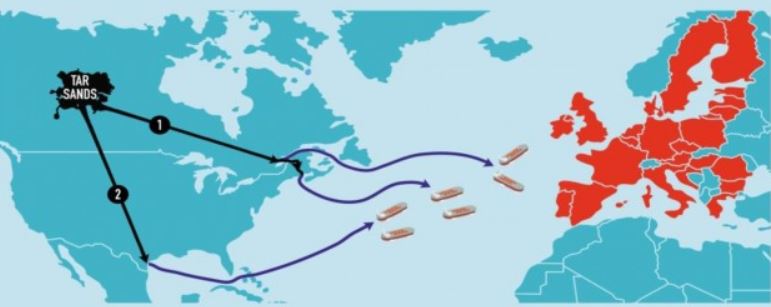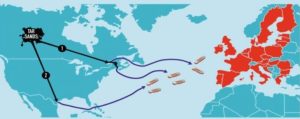
Tar Sands Imports to EU Equivalent to Six Million Extra Cars
As the European Commission continues to deliberate as to whether to adopt its landmark climate change legislation, called the Fuel Quality Directive (FQD), there is increasing evidence that planned pipelines in North America could turn Europe into a significant market for the Canadian tar sands.
 As the European Commission continues to deliberate as to whether to adopt its landmark climate change legislation, called the Fuel Quality Directive (FQD), there is increasing evidence that planned pipelines in North America could turn Europe into a significant market for the Canadian tar sands.
As the European Commission continues to deliberate as to whether to adopt its landmark climate change legislation, called the Fuel Quality Directive (FQD), there is increasing evidence that planned pipelines in North America could turn Europe into a significant market for the Canadian tar sands.
An analysis by the American NGO, the Natural Resources Defense Council (NRDC) reveals that, unless Europe takes action to prevent it, an estimated 5.3 to 6.7% of its crude oil and transport fuels will likely come from dirty tar sands by 2020.
Although this may seem like a small percentage, it is 30 times higher than previously estimated by the Commission.
As the tar sands are significantly more carbon intensive than conventional fuels, this is the equivalent of adding a staggering six million extra cars to Europe’s roads by 2020.
It also means that whereas the FQD requires that fuel suppliers decrease carbon intensity by 6 per cent by 2020, the intensity would actually increase by 1.5 by 2020.
It goes without saying that the dirty tar sands would make it much harder and more expensive for the FQD to be realised.
One way to achieve the FQD targets with tar sands oil is to add more biofuels, but the economic cost of this is put by NRDC at 4 billion EUR a year, at the same time as taking away precious farm land for food. “This cost would ultimately be borne by European drivers and taxpayers”, warns the NRDC.
I and many others have been documenting the relentless lobbying by the Canadians and oil industry to undermine the FQD.
The NRDC argues that the FQD could be “a game-changer for the future of the tar sands industry”, and so it is no surprise therefore that the Canadians are doing everything in their power to undermine it.
“Canada’s politicians and their best friends from Shell and BP are desperate to open up new markets for their polluting oil” argues Franziska Achterberg, Greenpeace EU transport policy director, said about the new research. “They have used all the tricks in the book for Europe to ignore its own environmental standards. If Europe fails to stand by its laws, it will allow a flood of tar sands to wreck its carbon footprint.”
And the risk of the tar sands is not just to the EU.
American Scientists are warning that back in North America the transport of tar sands products carries “environmental risks, regulatory holes and serious unknowns.” These risks relate to the transport of tar sands by pipeline, rail and tanker.
The U.S. National Oceanic and Atmospheric Administration has examined different ways to transport the tar sands to market including the controversial Keystone XL and Northern Gateway pipelines. Their report was written by six scientists from the University of Washington’s School of Marine and Environmental Affairs.
It was overseen by Professor Robert Pavia: “In my mind, it’s not a question of whether a spill will occur, but how well-prepared we are for a spill once it does occur.”
His warning is eerily reminiscent of the words spoken by Dr Riki Ott, a marine biologist the night before the Exxon Valdez ran aground in 1989, spilling over 11 million gallons of oil into the pristine Arctic environment: “Gentleman, it is not a matter of what if, but when.”
